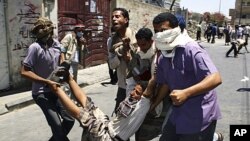Clashes were reported in at least four Yemeni cities Tuesday between supporters of President Ali Abdullah Saleh and protesters who want him to resign. The violence came as the Gulf Cooperation Council prepares to host talks between loyalists and opponents of the longtime leader.
Violent clashes broke out in the city of Taiz again Tuesday after security forces fired on anti-government protesters. Scuffles also broke out between rival crowds of pro- and anti-government demonstrators. Hundreds of protesters were wounded in the melee.
In the capital Sana'a, clashes erupted after tribesmen loyal to President Ali Abdullah Saleh met with General Ali Mohsen al Ahmar, who recently pledged loyalty to the opposition. Tribal leaders were hoping to convince the general to change sides again.
Student demonstrators later took to the streets of Sana'a to protest several deaths, chanting "peaceful, peaceful" as they marched.
|
Cecily Hilleary speaks about the situation in Sana’a with Yemen Times editor/reporter Tom Finn:
|
Tom Finn of the Yemen Times newspaper says the mood was tense, but that the protest remained peaceful:
"[There are] 500 or 600 mainly young men in their early twenties all wearing tee-shirts which say Organization of the Yemeni Martyrs. Apart from some throwing of stones and some shouting and general anger from these protesters towards the riot police, there have not been any gunshots fired yet, but it's a very tense situation. It's the first time they've moved outside of the safety of Sana'a University area. So, it's unclear what's going to happen," he said.
Al Jazeera TV reported that other large protests took place in both the northern town of Hodeida and the southern port city of Aden. Witnesses say protesters were injured in both places after security forces fired tear gas at the crowds.
Yemeni opposition leaders are calling on the international community and human rights groups to put a stop to the recent violence and bloodshed. Dozens of people have been killed and hundreds wounded since protests began on February 11.
European Union foreign policy head Catherine Ashton condemned the violence, denouncing the use of live ammunition against protesters. She urged President Saleh to start handing over power immediately.
Meanwhile, President Saleh called on the opposition to join talks to put an end to the weeks of unrest and violence. Marina Ottaway of the Carnegie Endowment for Peace in Washington says that the Yemeni leader finds himself in a serious bind, with no honorable solution.
"He just does not see a way out. The outlines of a compromise, which would allow him to either remain in the country, although not in power, or to maintain his money and get out of the country as a free man are just not there," she said.
Ottaway says, however, that Mr. Saleh cannot remain in power indefinitely because he has lost the support of neighboring Saudi Arabia.
She says the Saudis were clear that they had to intervene in the unrest of another neighbor, Bahrain, because of Iranian influence with some of the Bahraini protesters. But, in Yemen, she says, the Saudis told her that they "know how to handle tribes," which was a way of saying "we can handle the situation if Mr. Saleh goes."
The Gulf Cooperation Council, of which Saudi Arabia is the driving force, has invited the Yemeni government and the opposition to talks in the Saudi capital, Riyadh.




